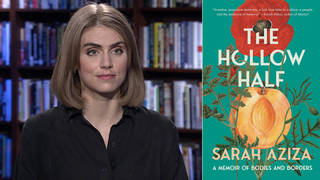
We speak with Ernest Wilson, a board member for the Corporation for Public Broadcasting about Monday’s hearing, Kenneth Tomlinson’s monitoring of the political content of public broadcasting and the hiring of former RNC co-chair Patricia Harrison as CEO of the CPB. [includes rush transcript]
- Ernest Wilson, a board member of the Corporation for Public Broadcasting. He was first appointed by President Clinton in September 2000 and re-appointed by President George W. Bush in November 2004. He is a Professor of Government and Politics and Afro-American Studies in the School of Public Affairs at the University of Maryland.
Transcript
AMY GOODMAN: We’re joined right now on the phone by Ernest Wilson. He is a board member of the Corporation for Public Broadcasting, first appointed by President Clinton, like Tomlinson, in September of 2000 and reappointed by George W. Bush in November of 2004. Professor Wilson teaches Government and Politics and Afro-American Studies at the School of Public Affairs at the University of Maryland. We welcome you to Democracy Now!
ERNEST WILSON: Thank you, it’s good to be here.
AMY GOODMAN: It’s good to have you. Can you respond to the questioning you have just been listening to from yesterday’s hearing?
ERNEST WILSON: Well, I think the — you know, clearly we’ve been — there’s been a huge amount of turmoil over the past 30 days or longer over the question of what’s called objectivity and balance or bias. I attended the hearing yesterday that was chaired by Senator Specter, and person after person pointed out just the following facts — and here I just want to put this down on the record — that when you compare public broadcasting to all other institutions in American society — the Judiciary, the Executive, even the Legislative branch of government — by a big majority Americans find that they get huge value from Public Broadcasting. It is by far their preferred institution. When you ask Americans to compare Public Broadcasting with private broadcasting, CNN, Fox, etc., by far most Americans believe that Public Broadcasting is more objective and balanced than private broadcasting; and we could go on and on with the opinion of teachers and the opinion of other viewers. So I think that the whole issue of objectivity and balance is way, way out of proportion — has been blown out proportion over the past month or so. And unfortunately, as a consequence of this, most of the members of the Public Broadcasting station or community, NPR, PBS, local stations, have been critical of what the CPB has done; and so I think that the whole question of objectivity and balance has been blown way out of proportion.
AMY GOODMAN: Professor Wilson, can you talk about the poll that the Chair, Kenneth Tomlinson, of CPB had commissioned? Did you know about it? Was it put out publicly?
ERNEST WILSON: No. The board did not know about that poll. It has been said in the press again and again, and it is — I’m concerned about that. Does the Chair have the authority to do this? Perhaps. Has the Chair done this in the past, or other chairs? I don’t know of any that have done this at all.
AMY GOODMAN: And what was the poll? What were the results of the poll that he — are you saying he suppressed this poll?
ERNEST WILSON: Well, the — I never —- I have never seen it to this day. I still have not seen it. And, you know, the question is not simply legality but it’s a question of, in fact, whether or not what the rest of the board is being shown is fair and balanced. I mean, if we’re going to do these polls and the federal government is going to pay for them, then these are issues that need to be discussed before the board; and my concern, my big concern is that -—
AMY GOODMAN: Yes?
ERNEST WILSON: And our other members of the family and within the board that we have to enhance the transparency and openness with which these kinds of discussions proceed.
AMY GOODMAN: Professor Wilson, the issue of the paying of this Fred Mann of Indianapolis more than $14,000 to monitor the political content of Public Radio and Television shows and listening to Senator Durbin saying the report was faxed to him, to Tomlinson, from a Hallmark store in Indianapolis, who’s Fred Mann? Did you also approve this?
ERNEST WILSON: No, that did not come before the board. And, again, you know, my view is that when these issues — if you have routine things — and there are certainly things that the Chief Executive Officer or the Chair can do — but for matters that are clearly of a sensitive nature that go to the very core of what it means to be Public Broadcasting, these are issues that should be more widely shared on the board and in the broader public.
On the question of fairness and balance or objectivity and balance, you know, I would say — and we have to be, you know, politically realistic here — if, you know, a bunch of your appropriators and authorizers say that we want to see something done on fairness and balance, then it’s the fiduciary responsibility of the board to at least address that question. But my view now is that that has been done. We have — ombudsmen have been appointed. This issue has been aired and discussed, and the point now would be to declare a success and move on to the other burning issues that confront Public Broadcasting, issues of lack of ethnic diversity, racial diversity in our Public Broadcasting system. The fact that we are losing market share on the television side, that new technologies and new platforms are challenging us, and that our revenue base is shaky. These are the issues that really demand the attention of the Public Broadcasting system and the legislature, and I think it’s to those things we should turn our attention.
AMY GOODMAN: We’re talking to CPB board member Ernest Wilson. What about the hiring of Patricia Harrison to be the President of CPB, the former co-chair of the Republican National Committee from 1997 to 2001? You’re a board member. Did you vote for her?
ERNEST WILSON: Well, I have been on record as saying publicly that I have been — I was disturbed by the way in which the search was conducted. This is not to say anything about Patricia Harrison, but it is to say that we shouldn’t select anyone from a — who has run one of the national political parties. I mean, I’m a democrat; but it would not be appropriate to have the former co-chair of the Democratic National Committee be the C.E.O. of the Corporation for Public Broadcasting, which is supposed to be a heat shield.
Secondly, the way the search was conducted, it was, I think, rushed and hurried and done in 60 days when usually these things take much longer so that we can get a full vetting and we can get as many opportunities to look at as many diverse candidates as we possibly can. And so, I’m on public record as saying I think both of those things were violated in the case of this search. Now, the reality is that she is currently the C.E.O.; and so, I think all of us in the Public Broadcasting system are going to have to judge her by her deeds and her words. She’s a smart woman. She’s very savvy. I think she did a — had a good performance yesterday at her first public hearing; and so, I’m certainly anxious to work with her. And I think the way that we need to move forward is to concentrate on the real issues that are bedeviling Public Broadcasting these days.
AMY GOODMAN: Ernest Wilson, I want to thank you for being with us and hope we can continue this conversation with you on future broadcasts. Ernest Wilson, board member of the Corporation for Public Broadcasting. Thank you.













Media Options